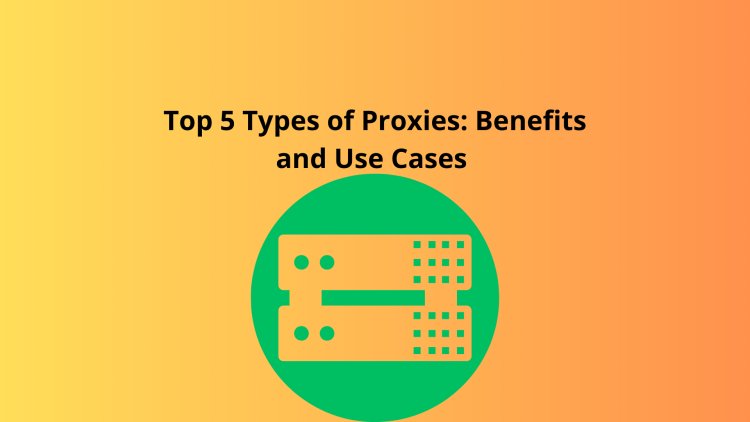Top 5 Types of Proxies: Benefits and Use Cases
Learn about the 5 most common types of proxies: residential, data center, SOCKS, HTTP/HTTPS, and transparent. Discover their unique benefits and use cases to enhance your online privacy, security, and browsing speed.

Proxies play a crucial role in online privacy, security, and performance. They act as intermediaries between users and websites, providing a variety of benefits such as anonymity, faster browsing, and access to restricted content. In this article, we’ll explore the top 5 types of proxies, their key features, benefits, and typical use cases.
1. Residential Proxies
Benefits:
- Provide a high level of anonymity since they use IP addresses associated with real residential addresses.
- Harder to detect as they appear to come from real users, reducing the risk of being blocked.
Use Cases:
- Web scraping without getting blocked.
- Managing multiple social media accounts.
- Bypassing geographical content restrictions.
2. Data Center Proxies
Benefits:
- Fast connection speeds and affordable compared to residential proxies.
- Can handle large volumes of requests with minimal downtime.
Use Cases:
- Data mining and bulk web scraping.
- Competitive analysis or price tracking.
- Accessing content or services that may be limited in certain regions.
3. SOCKS Proxies
Benefits:
- Support a wide range of protocols and services beyond HTTP/S, including FTP and P2P.
- Provide a high level of privacy by not forwarding identifying information.
Use Cases:
- Torrenting and peer-to-peer file sharing.
- Secure online gaming and streaming.
- Bypassing firewalls and geographical restrictions.
4. HTTP/HTTPS Proxies
Benefits:
- Specialized for web browsing, which makes them ideal for high-speed and efficient data transmission.
- Easy to configure and use with minimal technical knowledge.
Use Cases:
- Browsing the web anonymously.
- Accessing blocked websites.
- Caching content for faster access.
5. Transparent Proxies
Benefits:
- Do not modify the request or response, making them transparent to the user.
- Often used by network administrators to monitor user traffic without requiring any configuration on the user’s side.
Use Cases:
- Content filtering and bandwidth usage monitoring in organizations.
- Caching frequently accessed websites to speed up access in corporate networks.
- Load balancing to manage high traffic volumes efficiently.
Conclusion
Each type of proxy offers unique benefits tailored to specific needs. By understanding the advantages and use cases of residential, data center, SOCKS, HTTP/HTTPS, and transparent proxies, users can make informed decisions based on their requirements, whether it's for enhanced security, privacy, or improved internet performance.
This article structure ensures clarity, SEO optimization, and valuable insights into proxy types for a wide range of audiences.
What's Your Reaction?


















